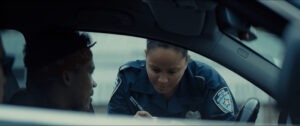
If you are pulled over by the police while driving, you must know your rights to protect yourself and avoid any unnecessary legal trouble. We encourage you to reach out to an attorney if you have any questions about your specific interaction with a law enforcement officer.
Do I Have to Pull Over Immediately When I See Police Lights?
Yes. When you see police lights or hear a siren, you must pull over to the side of the road as soon as it is safe to do so. You have the right to remain silent. You do not have to answer questions except by providing your name and identification if requested. You may also be required to provide your driver’s license, registration, and proof of insurance.

Detaining without Arresting – What Happens
Yes, the police can detain you briefly for investigative purposes, but they must have a reasonable suspicion that you have committed or are about to commit a crime. If the police have probable cause to believe you have committed a crime, they may arrest you without a warrant. Ask for a lawyer immediately and refrain from answering questions until your lawyer is present. The police are authorized to use force only if necessary to protect themselves or others from harm.
Can the Police Search My Vehicle without My Consent?
Yes, if they have probable cause or a warrant. Probable cause is when the police believe that a crime has been committed or that evidence of a crime is in the vehicle. You should politely refuse the search and ask if you can leave. If the police have probable cause or a warrant, they may still search your vehicle.
The police may search your trunk without your consent if they have probable cause to believe that it contains evidence of a crime or if they have a warrant.
Can the Police Search My Cell Phone During a Traffic Stop?
The police may search your cell phone during a traffic stop if they have a warrant or if they have probable cause to believe that it contains evidence of a crime. However, recent court rulings have placed limits on the ability of police to search cell phones without a warrant.
Can the Police Use a Drug-Sniffing Dog During a Traffic Stop?
Yes, the police may use a drug-sniffing dog during a traffic stop if they have probable cause to believe that drugs are in the vehicle. However, recent court rulings have limited the use of drug-sniffing dogs, and the police must have a valid reason for using the dog.
Can I Be Arrested for Refusing to Sign a Traffic Ticket?
No. Refusing to sign a traffic ticket may result in the police officer arresting you, but you cannot be arrested solely for refusing to sign. It is generally advisable to sign the ticket to avoid any additional legal complications.
Can I Be Charged with a Crime for Not Wearing a Seatbelt During a Traffic Stop?
Depending on the state, you may be fined for not wearing a seatbelt, but it is generally not a criminal offense. However, if the police officer discovers other violations during the traffic stop, you may be charged with additional offenses.
Can the Police Ask Me to Perform a Field Sobriety Test During a Traffic Stop?
Yes, the police may ask you to perform a field sobriety test if they have probable cause to believe that you are driving under the influence of drugs or alcohol. However, you can refuse the test, and there may be consequences.
Can the Police Ask Me to Consent to a Search of My Person During a Traffic Stop?
Yes, the police may ask you to consent to a search of your person during a traffic stop. However, you have the right to refuse the search, and the police must have a valid reason to conduct the search, such as a probable cause or a warrant.
Can the Police Use Excessive Force During a Traffic Stop?
No, the police are prohibited from using excessive force during a traffic stop or any other interaction with the public. If you believe the police used excessive force, you should document the incident and contact a lawyer immediately. The use of excessive force has been a major focus of media scrutiny over the last few years, but this has not alleviated the problem. Even with most officers required to use body cams, unwarranted force is still used regularly during traffic stops throughout South Carolina.

What to Do if My Rights Were Violated During a Traffic Stop
If you believe that your rights were violated during a traffic stop, you should document as much information as possible, including the officer’s name, badge number, and the location of the stop. You may also want to contact a lawyer to discuss your legal options.
Contact Shelly Leeke Law Firm today for more help. Our team is ready to step in and investigate your case. We want to make sure your rights are upheld every step of the way, especially if you sustained an injury.







